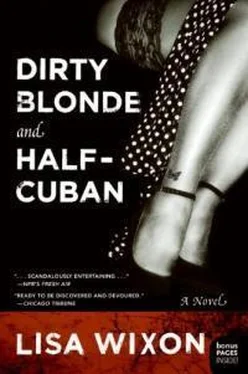Lisa Wixon - Dirty Blonde and Half-Cuban
Здесь есть возможность читать онлайн «Lisa Wixon - Dirty Blonde and Half-Cuban» весь текст электронной книги совершенно бесплатно (целиком полную версию без сокращений). В некоторых случаях можно слушать аудио, скачать через торрент в формате fb2 и присутствует краткое содержание. Жанр: Современная проза, на английском языке. Описание произведения, (предисловие) а так же отзывы посетителей доступны на портале библиотеки ЛибКат.
- Название:Dirty Blonde and Half-Cuban
- Автор:
- Жанр:
- Год:неизвестен
- ISBN:нет данных
- Рейтинг книги:4 / 5. Голосов: 1
-
Избранное:Добавить в избранное
- Отзывы:
-
Ваша оценка:
- 80
- 1
- 2
- 3
- 4
- 5
Dirty Blonde and Half-Cuban: краткое содержание, описание и аннотация
Предлагаем к чтению аннотацию, описание, краткое содержание или предисловие (зависит от того, что написал сам автор книги «Dirty Blonde and Half-Cuban»). Если вы не нашли необходимую информацию о книге — напишите в комментариях, мы постараемся отыскать её.
Dirty Blonde and Half-Cuban — читать онлайн бесплатно полную книгу (весь текст) целиком
Ниже представлен текст книги, разбитый по страницам. Система сохранения места последней прочитанной страницы, позволяет с удобством читать онлайн бесплатно книгу «Dirty Blonde and Half-Cuban», без необходимости каждый раз заново искать на чём Вы остановились. Поставьте закладку, и сможете в любой момент перейти на страницу, на которой закончили чтение.
Интервал:
Закладка:
46
A t the fruitstand near my home, I’m stocking up on peso guayaba,petite bananas, tomatoes, and my favorite, mamey.Produce, when available, is cheap and organic and scrumptious. Despite the sparse quantity, the state overstaffs the corner market, and the workers have little to do other than drink peso rum and contribute to the barrio’s Radio Bemba.
“How much is the papaya?” I ask.
All the men burst into laughter.
“Otra.”Again, prompts the clerk, gesticulating.
“¿Cuál es la mecánica?”What’s the deal, I ask, exasperated, and holding up the fruit. “How much is this papaya?”
“ Mi vida,I don’t know how much your papaya goes for,” he says. “But that there fruta bombain your hand is twenty-five pesos.” The men are nearly doubled over with laughter now.
Limón tells me later that papaya means pussy, and my face turns eggplant. He tells me I’m not paying attention if I can be here almost nine months and still not know this. I vow to walk the long way home from then on.
MY BAGS ARE on the curb. My landlady won’t open the door, but tells me through colonial wood and hinges that I’m no longer welcome, that my friends are scum, dientes de perros,that the neighborhood-watch types have been grumbling.
She took a month’s rent the night before.
I sit on the curb and look around. The air is thick, different. More pungent. A discomfiting silence permeates the normally chatty streets. Absent are the hucksters and girls in too-tight Lycra. Discos have been shuttered. Cubans soliciting foreigners are being arrested.
The world may be crying for jailed dissidents, but everyday folks here have more immediate concerns. Namely, the police. And how to fly under the radar.
As I drag my luggage from one illegal rental to another, to Camila’s house a few blocks away, I watch a bemused Walrus chugging behind, wondering what trouble his charge has managed now. Camila convinced me it was no bother, but I know a foreigner living without a permit in a local’s house can only cause problems.
But my real sorrow is Victor, whom I’d sworn not to contact, and who will not know how to find me now.
After I send a quick e-mail to Susie, I find myself wandering through the domed Capitolio Nacional, the former house of senate and representatives. Inside its palatial walls lies the nation’s centerpiece—a revered diamond in the floor. The diamond is covered by thick sheets of glass, and a bronze goddess nearly sixty feet tall oversees its safety. The jewel marks the very heart of Cuba, the zero point. From it, all distances in the country are measured.
Today, I climb the steps and seek the diamond, hoping it can demarcate not only distance but also time. It’s a gemstone, and it’s a crystal ball, and within its remedial powers are answers to questions of space and time. What is the distance faith travels? What is the distance of my determination?
Tell me, where and when will I find my father?
Tell me the distance of a daughter’s longing, the distance from the zero point to the temporal and spatial coordinates of discovering the street where my family lives. For the rain that falls from my roof is the water they walk in on the way to the market.
Tell me the distance.
47
T he Syrian bankerclutches his chest and tumbles from the podium. The audience, composed of Cuban economists, gasp collectively. Their speaker arrived in a Soviet-era ZIL limousine, but leaves in a Cuban ambulance.
Camila tends to Farouk’s corrupted heart at her clinic. After a few weeks, and probably a bit longer than professionally necessary, she releases him. Under her care, he’s developed another affliction, a psychosomatic one, and his symptoms signal an attack on the same organ.
Farouk is in love.
“Stockholm syndrome,” says Camila, blowing triumphantly on her nails.
Ali, his sidekick, is less convinced of my charms, but agrees the four of us should burn through the candle of a Havana night. The days, lately, are too hot for anything but sleeping.
“To drink?” asks the waiter. We’re in a basement Latin jazz club on La Rampa, awaiting the live music. As the men order Cuba libres, Camila watches me slyly, to see if I’ve developed chemistry with my latest charge.
“My guess is you’re having a mojito,” says Camila, speaking to me in the code we use to describe our dates. Liquors and mixed cocktails rate highest, beer and peso rum measure in at the wrong end of the scale.
“Last night,” I confide, “I had a Cristal beer. Never, ever again am I going to drink Cristal. Made me belch. From now on it’s at least, at least,a mojito.”
“That’s what I love to hear,” she says.
The waiter is irritated. “Want a mojito or what?”
I study my date and rub my chin. “Perhaps a mojito.”
“She’s having a Hemingway daiquiri,” chimes an optimistic Camila to the waiter.
“Same for you?” he asks.
“No, no, mi vida,” she says mischievously. “Make mine a rum, fifteen years.”
“Ooooh,” I say. “That good, huh?”
She waves a hand near her cheek and winks at the waiter. “Cool it with some ice, would ya?”
The band arrives and soothes with classics. Latin jazz would never have formed without the amalgamation of Cubans and Americans. Ragtime and rhythm and blues would not have existed without the influence of Cuban music. I think also of the other great Cuban contributions to American pop culture, such as top-paid baseball and movie stars. Using its educated labor force, Cuban research companies are busy unscrambling the mystery of a cancer cure. I wonder what further brilliance could erupt if the freeze between our countries could thaw.
But I’ve little time to ponder because I’m attending to the droll Ali. He tells me he’s Moroccan, from Rabat, and not Syrian like his boss Farouk. Ali proclaims that I, as a Cuban, should enjoy the privileges of living in a country that provides vaccinations, enjoys a near-perfect literacy rate, and schools its children, even the farm kids, at least through ninth grade.
Then he invites me up to his $445-a-night suite.
The Hotel Santa Isabel, a former eighteenth-century palace overlooking the sumptuous Plaza de Armas, is the country’s most luxurious inn. I pretend not to understand Ali’s rough Spanish, so as not to snicker over the irony of a lecture on gratitude from someone living in spacious rooms, with marbled walls and 600-count Egyptian cotton sheets.
Instead, I pull him toward me and slip off the Hermés tie and the Ralph Lauren suit of a poor country’s top businessman. I’m white, so the sentry assigned to the hotel’s lobby accepted Ali’s $40 handshake and I was cleared to the top floor. If my skin color came in a darker pigmentation, I’d likely not be allowed inside the rooms of my own country’s showcase hotels, regardless of the heft of a yuma’s bribe.
Fueled by the confidence of a few Hemingway daiquiris, I push Ali down on a silky couch and, with my back to him, provide a flirtatious preview. Nervously, he prattles on about his country while caressing my bottom.
To tell Ali that I’ve been to Morocco would be to belie the fantasy he’s paying for, the invention that I’m an exotic cubanaand therefore naïve of world affairs. It takes all my skill to hang, fascinated, on his sophomoric diatribe on international politics.
He needs to shut up, so I move down on my knees, and as I go in for the kill, he pushes me back gently and snaps off the light. Then he stands up and, at the bed, rips off the top sheet.
“ Habib,would you,” he says, his face illuminated by the golden lights that hang like angels over the Plaza.
“Yes,” I say. More of a question.
He hands me the sheet. “In my country, a woman does not have relations until she’s married. Women who have sex before marriage are prostitutes. Once she’s married, if her husband leaves her, no one will marry her, she stays alone or becomes a whore. No one will marry a used woman.”
Читать дальшеИнтервал:
Закладка:
Похожие книги на «Dirty Blonde and Half-Cuban»
Представляем Вашему вниманию похожие книги на «Dirty Blonde and Half-Cuban» списком для выбора. Мы отобрали схожую по названию и смыслу литературу в надежде предоставить читателям больше вариантов отыскать новые, интересные, ещё непрочитанные произведения.
Обсуждение, отзывы о книге «Dirty Blonde and Half-Cuban» и просто собственные мнения читателей. Оставьте ваши комментарии, напишите, что Вы думаете о произведении, его смысле или главных героях. Укажите что конкретно понравилось, а что нет, и почему Вы так считаете.












